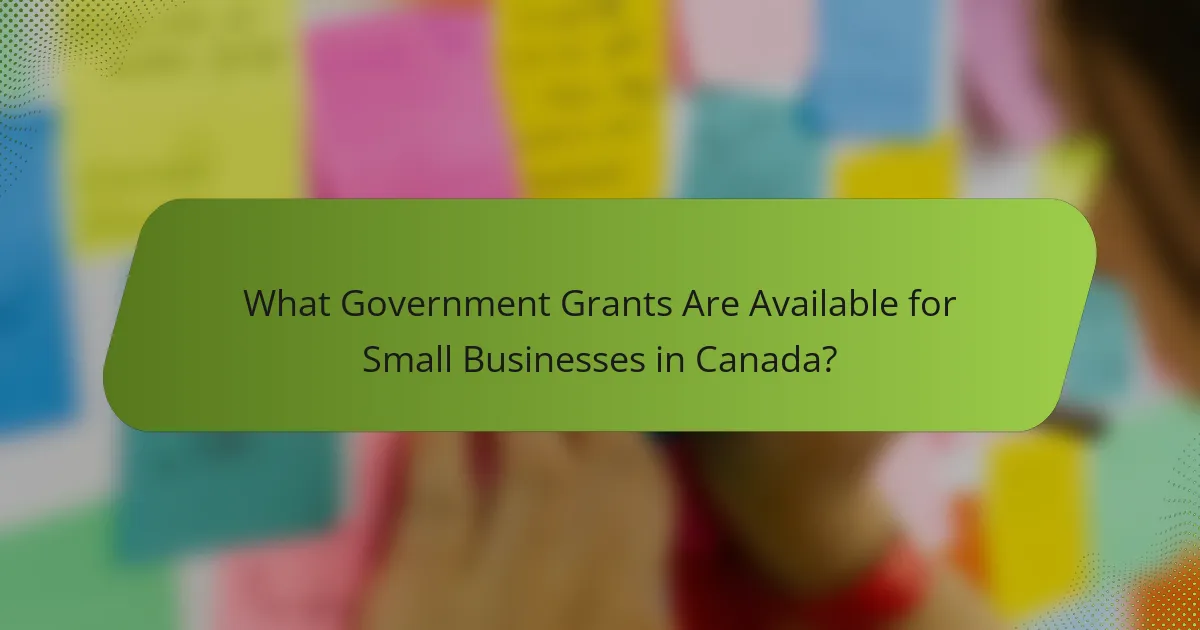In Canada, government grants play a crucial role in supporting the development and growth of small businesses by offering financial assistance for various initiatives, such as innovation and expansion. These grants not only provide essential funding that does not require repayment but also help businesses enhance their sustainability and competitiveness in the market. Understanding how to identify suitable programs and navigate the application process is key for entrepreneurs looking to leverage these valuable resources.

What Government Grants Are Available for Small Businesses in Canada?
In Canada, various government grants are designed to support small businesses in their development and growth. These grants can provide financial assistance for a range of activities, including innovation, expansion, and export initiatives.
Canada Small Business Financing Program
The Canada Small Business Financing Program (CSBFP) helps small businesses access loans to purchase or improve assets. This program allows businesses to borrow up to CAD 1 million, with a portion guaranteed by the government, making it easier to secure financing from lenders.
Eligible expenses include purchasing equipment, improving real estate, and acquiring inventory. Businesses should ensure they meet the criteria, such as being a for-profit entity and having gross annual revenues below CAD 10 million.
Innovative Solutions Canada
Innovative Solutions Canada (ISC) focuses on funding research and development projects that lead to innovative products and services. The program offers funding of up to CAD 1 million for projects that address specific government challenges.
To apply, businesses must demonstrate how their innovations can solve a problem faced by the government. Successful applicants can benefit from not only funding but also potential contracts with government departments.
Regional Development Agency Grants
Regional Development Agency Grants provide financial support tailored to specific regions in Canada, such as Atlantic Canada or Western Canada. These grants aim to stimulate economic growth and job creation in underserved areas.
Each regional agency has its own application process and eligibility criteria, often focusing on projects that promote innovation, infrastructure, or community development. Businesses should check the specific agency relevant to their location for detailed guidelines.
Export Development Canada Grants
Export Development Canada (EDC) offers grants and financing solutions to help Canadian businesses expand into international markets. These grants can cover costs related to market research, trade shows, and export training.
Businesses looking to export should explore EDC’s resources, which include not only financial support but also advisory services to navigate the complexities of international trade.
Indigenous Business Grants
Indigenous Business Grants are specifically designed to support Indigenous entrepreneurs and businesses in Canada. These grants can provide funding for various initiatives, including startup costs, business expansion, and community projects.
Eligibility often requires that the business is at least 51% Indigenous-owned. Various organizations and government programs offer these grants, so it’s essential for applicants to research options available in their region and sector.

How to Apply for Government Grants in Canada?
Applying for government grants in Canada involves identifying suitable programs, meeting eligibility criteria, and submitting a detailed application. These grants can provide essential funding for small businesses, helping them grow and innovate.
Eligibility Requirements
To qualify for government grants in Canada, businesses typically need to demonstrate that they meet specific criteria. This may include being a registered business, operating within certain industries, or meeting size standards, such as having fewer than 500 employees.
Additionally, some grants may require businesses to be located in particular regions or to serve specific markets. It’s crucial to review the eligibility details of each grant program to ensure compliance.
Application Process Overview
The application process for government grants generally involves several key steps. First, businesses must research available grants and select those that align with their goals. Next, they should prepare a comprehensive application that outlines their business plan, objectives, and how the grant will be utilized.
After submission, applications are usually reviewed by government officials who assess the proposal’s viability and alignment with funding priorities. Be prepared for potential follow-up questions or requests for additional information during this stage.
Required Documentation
When applying for government grants, businesses must gather and submit various documents. Common requirements include a business plan, financial statements, tax returns, and proof of registration. Some programs may also ask for letters of support or evidence of market research.
Ensuring all documentation is accurate and complete is vital, as incomplete applications can lead to delays or disqualification. Create a checklist of required documents tailored to each grant to streamline the process.

What Are the Benefits of Government Grants for Small Businesses?
Government grants provide significant advantages for small businesses in Canada, primarily by offering financial assistance that does not require repayment. These grants can enhance business growth, support innovation, and improve overall sustainability.
Financial Support Without Repayment
One of the most appealing aspects of government grants is that they offer financial support without the burden of repayment. Unlike loans, grants do not need to be paid back, allowing businesses to invest in growth without the pressure of debt. This can be particularly beneficial for startups or businesses in their early stages.
Grants can range from a few thousand to several hundred thousand Canadian dollars, depending on the program and the specific needs of the business. It’s essential to research available grants and understand the eligibility criteria to maximize funding opportunities.
Access to Resources and Networks
Government grants often come with access to valuable resources and networks that can help small businesses thrive. Many grant programs provide additional support, such as mentorship, training, and workshops, which can enhance business skills and knowledge.
Networking opportunities through grant programs can connect entrepreneurs with industry experts, potential partners, and other businesses. This collaborative environment can lead to new opportunities and insights that may not be available otherwise.
Enhanced Business Credibility
Receiving a government grant can significantly enhance a small business’s credibility in the marketplace. Being awarded a grant indicates that the business meets specific standards and has been vetted by a governmental body, which can instill confidence in customers and investors.
Additionally, businesses that receive grants may find it easier to attract further investment or partnerships, as the grant serves as a validation of their business model and potential for success. This credibility can be a crucial factor in competitive industries.

What Criteria Should You Consider When Choosing a Grant?
When selecting a government grant for small business development in Canada, consider factors like funding amount, alignment with your business goals, and the complexity of the application process. These criteria will help you identify the most suitable grant opportunities for your needs.
Funding Amount
The funding amount available through grants can vary significantly, often ranging from a few thousand to several hundred thousand Canadian dollars. Assess your business needs and project scope to determine how much funding you require, and look for grants that meet those financial requirements.
Keep in mind that some grants may only cover a portion of your project costs, so it’s essential to have a clear budget and consider additional funding sources if necessary. Prioritize grants that provide sufficient funding to support your business objectives.
Grant Purpose Alignment
Ensure that the purpose of the grant aligns with your business goals and project plans. Grants may be designated for specific sectors, such as technology, agriculture, or green initiatives, so it’s crucial to match your project with the grant’s intended use.
Review the eligibility criteria and objectives outlined by the grant provider to confirm that your project fits within their framework. This alignment increases your chances of approval and ensures that the funding will effectively support your business development efforts.
Application Complexity
The complexity of the grant application process can vary widely. Some grants require extensive documentation and detailed project plans, while others may have a more straightforward application procedure. Evaluate your capacity to complete the application based on your resources and expertise.
Consider starting with grants that have a simpler application process if you are new to grant writing. This approach allows you to gain experience and build confidence before tackling more complex applications. Additionally, be aware of deadlines and required materials to avoid last-minute complications.

What Are Common Challenges in Securing Grants?
Securing grants for small business development in Canada can be challenging due to various factors. Common obstacles include intense competition, complex application processes, and stringent eligibility criteria that can deter potential applicants.
Understanding Eligibility Requirements
Eligibility requirements for grants can vary significantly depending on the funding source. Many grants are aimed at specific sectors, such as technology or agriculture, and may require businesses to meet certain criteria related to size, revenue, or operational history.
To navigate these requirements, carefully review the guidelines provided by the granting agency. This will help you determine if your business qualifies and what documentation you need to prepare.
Navigating the Application Process
The application process for grants can be lengthy and complicated, often requiring detailed business plans and financial projections. It’s crucial to follow the instructions precisely and submit all required documents to avoid disqualification.
Consider creating a checklist of all necessary materials and deadlines to streamline your application process. Engaging with a mentor or consultant who has experience in grant applications can also provide valuable insights and improve your chances of success.
Competing with Other Applicants
Competition for government grants can be fierce, as many businesses vie for limited funding. To stand out, your application should clearly articulate your business’s unique value proposition and how the grant will help achieve specific goals.
Highlighting past successes, community impact, and alignment with the grant’s objectives can enhance your application. Tailoring your proposal to address the priorities of the funding agency is essential for increasing your chances of securing a grant.
